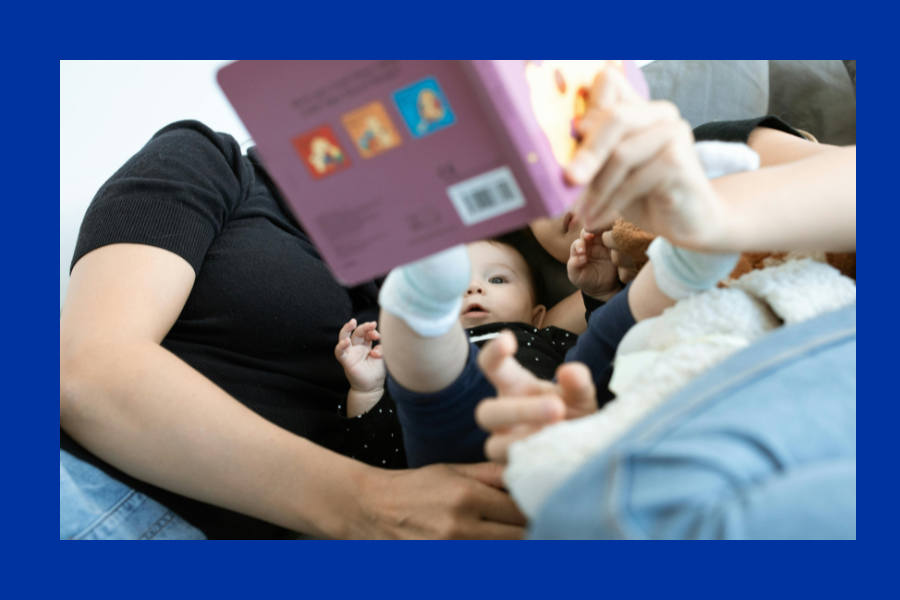
Creating Lifelong Readers: The Importance of Reading with Babies
March 19, 2025
Reading with your baby is a simple yet impactful activity you can do as a parent. Not only does it create a special bonding experience, but it also lays the foundation for cognitive development, language skills, and emotional growth. Research shows that early exposure to books and storytelling significantly benefits a child’s brain development, speech development, and future academic success. Here’s why reading with your baby matters and how to incorporate it into daily life.
The Science Behind Early Reading
Studies have shown that babies exposed to language through reading and conversation develop stronger neural connections in the brain. The American Academy of Pediatrics (AAP) recommends that parents start reading to their children from infancy because early literacy experiences enhance vocabulary acquisition and communication skills. A study published in Pediatrics found that families who read to children regularly from infancy had more extensive vocabularies and better comprehension skills when they entered kindergarten. Research published in the Journal of Applied Psycholinguistics titled “The Impact of Interactive Shared Book Reading on Children’s Language Development in Early Childhood” suggests that children who are read to regularly in the early years learn language faster and become more successful readers at school. This early advantage can have long-term effects, including higher academic achievement and better social-emotional regulation.
Benefits of Reading With Your Baby
Language and Vocabulary Development
Reading exposes babies to various words, sounds, and sentence structures. Even before they understand the meaning of words, they begin recognizing patterns in speech and tone. Hearing diverse words frequently strengthens their language comprehension, setting the stage for early talking and later reading skills.
Cognitive and Brain Development
Babies’ brains grow rapidly in the first few years of life. Reading books stimulates brain activity, helping with memory, problem-solving, and critical thinking. Brain imaging studies have shown that children who are read to from infancy have increased activity in the areas responsible for visual imagery and narrative comprehension.
Emotional Bonding
Reading provides an excellent opportunity for physical closeness and emotional bonding. The comfort of hearing a caregiver’s voice, feeling their touch, and experiencing shared attention fosters a sense of security and attachment. These positive interactions contribute to a baby’s social and emotional well-being.
Building a Love for Reading
Early exposure to books fosters a lifelong love of reading. Children who grow up with books and storytelling are likelier to become enthusiastic readers later in life, leading to academic success and a lifelong appreciation for learning.
Ways to Incorporate Reading Into Daily Life
Make Reading Part of Your Routine
Establish a daily reading ritual, such as reading before naptime or bedtime. Consistency helps babies associate books with comfort and relaxation.
Choose Age-Appropriate Books
For newborns, high-contrast books with bold patterns are ideal. As babies grow, board books with textures, flaps, and bright pictures capture their interest. Rhyming books and repetitive phrases help reinforce language learning.
Use Expression and Engagement
Read with enthusiasm, using different tones, voices, and facial expressions. This makes reading more engaging and helps babies grasp the emotional content of a story.
Encourage Interaction
Let babies touch, turn pages, and point at pictures. Ask questions, even if they can’t answer yet. Point to objects and name them, which strengthens their word associations.
Sing and Rhyme
Nursery rhymes, lullabies, and rhythmic books enhance auditory processing skills. Singing books or making up tunes to simple stories can make reading more fun.
Incorporate Books Into Playtime
Use books as part of imaginative play. For example, if reading about animals, make animal sounds together or use stuffed animals to act out scenes from the book.
Take Books Everywhere
Keep books in the diaper bag, car, and around the house. Read during feeding times, waiting at the doctor’s office, or a stroller walk in the park. With our free storytime app, military families can have storytime on demand with videos of books read by their service members or featured titles in our Spotlight Stories.
Reading with your baby is a simple yet powerful way to nurture their development. From enhancing language skills to fostering emotional connections, the benefits of early reading last a lifetime. Making books a natural part of daily life sets the foundation for a child’s love of learning and academic success. So, grab a book (check out our extensive list for inspiration), snuggle up, and enjoy the special moments of sharing stories together!
Our literacy resources are brought to you by Reader’s Digest Foundation.
